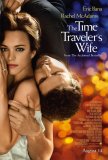Time Traveler's Wife, The (United States, 2009)
August 13, 2009
The Time Traveler's Wife is a conventional adaptation of an unconventional novel. That's not necessarily a bad thing - screenwriter Bruce Joel Rubin and director Robert Schwentke (Flightplan) impose structure on a story that, in Audrey Niffenegger's long and complex book, cartwheels freely through time. The film version plays like a "best hits" compilation, shoehorning in most of the key events while glossing over subplots and subtleties that are explored in depth on the written page. But that's the way it is with motion picture adaptations and, although this is not the best one, it's more than respectable and provides the romance, humor, and pathos demanded by fans of the genre.
The prominence of "time traveler" in the title might lead the viewer to believe this is a science fiction film, but it's nothing of the sort. At best, the chronological impairment can be considered a plot device - a fantasy conceit employed to enhance the love story's flavor. Ultimately, The Time Traveler's Wife succeeds not because it toys with things like time travel paradoxes (which it does, albeit not mind-bendingly) but because, as in all good romances, we learn to care about the characters and want them to experience happiness with each other.
Henry (Eric Bana)is a time traveler, although not by will. He can't control when it happens or where he will go (although he is frequently drawn to specific geographical and/or chronological points that have a particular resonance in his life), but the condition has afflicted him since age five, when he nearly died in a car accident that claimed his mother's life. Since clothing cannot travel with Henry, he appears naked at his destination, so finding garments is always job #1. Henry has been visiting Clare (Rachel McAdams) since she was a little girl - they first cross paths when she is six - but their encounter at a Chicago library when she is 21 is the first meeting for him and the umpteenth for her. She has long since fallen hopelessly in love with him, so it's natural for her to open her heart to him and join him in bed. It's a different story for Henry, who is stunned and awed by the way this woman comes into his life like a force of nature. It is fated, it seems, for them to become man and wife, but Henry's frequent, unpredictable travels (often into Clare's past) put a strain on their union, especially when he disappears on a two week excursion.
The screenplay keeps from losing coherence by anchoring itself to a "present" timeline associated with Clare's adult life. Henry's trips are shown in relationship to that fixed period and, since there are fewer than in the novel, the potential for confusion is reduced. It isn't hard to follow The Time Traveler's Wife, even considering the various Henrys that appear throughout Clare's past and the mobius strip that represents his lifeline. There's something incredibly compelling about love being a lifelong concept as only time travel can make it. These two characters discover each other in different ways at different times, and they're never quite on an equal footing until the end.
This is, of course, not the first recent movie to use time travel as a romantic ingredient. The 2006 film, The Lake House, postulated that two people separated by years might fall for each other via letters they deposit in a time traveling mailbox. The Time Traveler's Wife doesn't necessarily make more sense (no attempt is made to explain Henry's ability beyond stating that it's a genetic disorder sharing similarities with epilepsy), but it sounds less silly and plays out more credibly. The suspension of disbelief barrier isn't as high. And, while there are plenty of weepy moments in The Time Traveler's Wife, there's also a fair bit of humor. Consider, for example, the clever way in which Henry resolves what could have been a disaster on the day of his wedding, and the way some of the others - especially Clare - react to it.
The casting is solid. Eric Bana's low-key style proves effective for Henry, who is by nature a reserved and introverted character (until Clare, he is afraid of becoming close to anyone). Rachel McAdams, who earned her romantic movie credibility in The Notebook, is luminous. Her spirit and energy form the perfect counterpart to Bana's reticence. Interestingly, it's not only Bana and McAdams' chemistry that sells the pairing, but the more parental bond that forms between Bana (as the adult Henry) and Brooklynn Proulx, who plays Clare at six and eight. Don't worry - it's not as creepy as it might seem. (In the book, Henry is firm about their not being any overt sexual contact until Clare is eighteen. In the movie, they wait that long to kiss.)
The best thing about The Time Traveler's Wife is that the romance feels organic rather than manufactured. This isn't like The Proposal, where love magically materializes. Here, it literally grows over time. Also, the film honors its source material without being slavishly constrained by it. The movie's epilogue, although different from the one in the book, retains the story's tone. It's hard to imagine Niffenegger fans being upset by this film. The book is richer, but this is a solid, endearing telling of the same essential story, and is well worth the price of admission for those who appreciate romantic fantasy.
Time Traveler's Wife, The (United States, 2009)
Cast: Eric Bana, Rachel McAdams, Jane McLean, Ron Livingston, Stephen Tobolowsky
Screenplay: Bruce Joel Rubin, based on the novel by Audrey Niffenegger
Cinematography: Florian Ballhaus
Music: Mychael Danna
U.S. Distributor: New Line Cinema
U.S. Release Date: 2009-08-14
MPAA Rating: "PG-13" (Profanity, Sexual Situations, Discreet Nudity)
Genre: ROMANCE/DRAMA
Subtitles: none
Theatrical Aspect Ratio: 2:35:1
- (There are no more better movies of Jane McLean)
- (There are no more worst movies of Jane McLean)

Comments